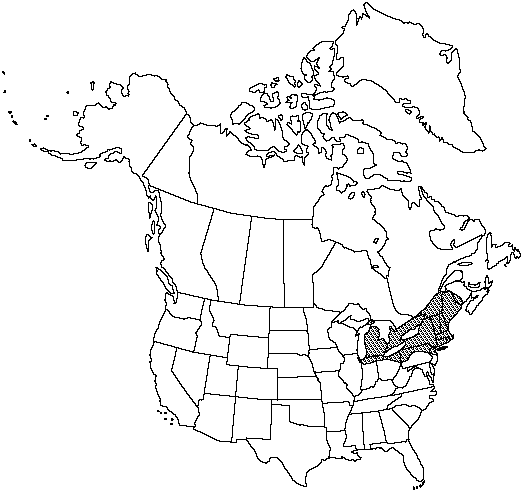Difference between revisions of "Dryopteris clintoniana"
Proc. Staten Island Assoc. Arts 1: 64. 1906.
FNA>Volume Importer |
RevisionBot (talk | contribs) m (Bot: Adding category Revised Since Print) |
||
| (10 intermediate revisions by 3 users not shown) | |||
| Line 8: | Line 8: | ||
}} | }} | ||
|common_names=Clinton's wood fern;dryoptère de clinton | |common_names=Clinton's wood fern;dryoptère de clinton | ||
| − | |basionyms={{Treatment/ID/ | + | |special_status={{Treatment/ID/Special_status |
| + | |code=E | ||
| + | |label=Endemic | ||
| + | }} | ||
| + | |basionyms={{Treatment/ID/Basionym | ||
|name=Aspidium cristatum var. clintonianum | |name=Aspidium cristatum var. clintonianum | ||
|authority=D. C. Eaton | |authority=D. C. Eaton | ||
| + | |rank=variety | ||
| + | |publication_title=in A. Gray, Manual ed. | ||
| + | |publication_place=5, 665. 1867 | ||
}} | }} | ||
|synonyms={{Treatment/ID/Synonym | |synonyms={{Treatment/ID/Synonym | ||
|name=Dryopteris cristata var. clintoniana | |name=Dryopteris cristata var. clintoniana | ||
|authority=(D. C. Eaton) L. Underwood | |authority=(D. C. Eaton) L. Underwood | ||
| + | |rank=variety | ||
}} | }} | ||
|hierarchy=Dryopteridaceae;Dryopteris;Dryopteris clintoniana | |hierarchy=Dryopteridaceae;Dryopteris;Dryopteris clintoniana | ||
| Line 23: | Line 31: | ||
}}<!-- | }}<!-- | ||
| − | --><span class="statement" id="st- | + | --><span class="statement" id="st-undefined" data-properties=""><b>Leaves </b>dimorphic, 45–100 × 12–20 cm; fertile leaves dying back in winter; sterile leaves 1–several, smaller, green through winter. <b>Petiole</b> 1/4–1/3 length of leaf, scaly at least at base; scales scattered, tan, sometimes with dark brown center. <b>Blade</b> green, lanceolate, with nearly parallel sides, pinnate-pinnatifid, herbaceous, not glandular. <b>Pinnae</b> of fertile leaves twisted out of plane of blade but not fully perpendicular to it, narrowly elongate-deltate; basal pinnae narrowly elongate-deltate, much reduced; basal pinnules longer than or equal to adjacent pinnules, basal basiscopic pinnule and basal acroscopic pinnule equal; pinnule margins serrate or biserrate, with spiny teeth. <b>Sori</b> midway between midvein and margin of segments. <b>Indusia</b> lacking glands. <b>2n</b> = 246.</span><!-- |
-->{{Treatment/Body | -->{{Treatment/Body | ||
| Line 29: | Line 37: | ||
|elevation=50–600 m | |elevation=50–600 m | ||
|distribution=N.B.;Ont.;Que.;Conn.;Ind.;Maine;Mass.;Mich.;N.H.;N.J.;N.Y.;Ohio;Pa.;R.I.;Vt. | |distribution=N.B.;Ont.;Que.;Conn.;Ind.;Maine;Mass.;Mich.;N.H.;N.J.;N.Y.;Ohio;Pa.;R.I.;Vt. | ||
| − | |discussion=<p>Dryopteris clintoniana is a North American endemic and an allohexaploid derived from D. cristata and D. | + | |discussion=<p><i>Dryopteris clintoniana</i> is a North American endemic and an allohexaploid derived from <i>D. cristata</i> and D. goldieana. <i>Dryopteris clintoniana</i> hybridizes with six species. Hybrids can be identified by the fairly narrow blades and elongate-deltate proximal pinnae.</p> |
|tables= | |tables= | ||
|references= | |references= | ||
| Line 38: | Line 46: | ||
-->{{#Taxon: | -->{{#Taxon: | ||
name=Dryopteris clintoniana | name=Dryopteris clintoniana | ||
| − | |||
|authority=(D. C. Eaton) Dowell | |authority=(D. C. Eaton) Dowell | ||
|rank=species | |rank=species | ||
| Line 51: | Line 58: | ||
|publication title=Proc. Staten Island Assoc. Arts | |publication title=Proc. Staten Island Assoc. Arts | ||
|publication year=1906 | |publication year=1906 | ||
| − | |special status= | + | |special status=Endemic |
| − | |source xml=https:// | + | |source xml=https://bitbucket.org/aafc-mbb/fna-data-curation/src/2e0870ddd59836b60bcf96646a41e87ea5a5943a/coarse_grained_fna_xml/V2/V2_547.xml |
|genus=Dryopteris | |genus=Dryopteris | ||
|species=Dryopteris clintoniana | |species=Dryopteris clintoniana | ||
| − | |||
| − | |||
| − | |||
| − | |||
| − | |||
| − | |||
| − | |||
| − | |||
| − | |||
| − | |||
| − | |||
| − | |||
| − | |||
| − | |||
| − | |||
| − | |||
| − | |||
| − | |||
| − | |||
| − | |||
| − | |||
| − | |||
| − | |||
| − | |||
| − | |||
| − | |||
| − | |||
| − | |||
| − | |||
| − | |||
| − | |||
}}<!-- | }}<!-- | ||
| − | -->[[Category:Treatment]][[Category:Dryopteris]] | + | --> |
| + | |||
| + | [[Category:Treatment]] | ||
| + | [[Category:Dryopteris]] | ||
| + | [[Category:Revised Since Print]] | ||
Latest revision as of 20:38, 6 November 2020
Leaves dimorphic, 45–100 × 12–20 cm; fertile leaves dying back in winter; sterile leaves 1–several, smaller, green through winter. Petiole 1/4–1/3 length of leaf, scaly at least at base; scales scattered, tan, sometimes with dark brown center. Blade green, lanceolate, with nearly parallel sides, pinnate-pinnatifid, herbaceous, not glandular. Pinnae of fertile leaves twisted out of plane of blade but not fully perpendicular to it, narrowly elongate-deltate; basal pinnae narrowly elongate-deltate, much reduced; basal pinnules longer than or equal to adjacent pinnules, basal basiscopic pinnule and basal acroscopic pinnule equal; pinnule margins serrate or biserrate, with spiny teeth. Sori midway between midvein and margin of segments. Indusia lacking glands. 2n = 246.
Habitat: Swampy woods
Elevation: 50–600 m
Distribution

N.B., Ont., Que., Conn., Ind., Maine, Mass., Mich., N.H., N.J., N.Y., Ohio, Pa., R.I., Vt.
Discussion
Dryopteris clintoniana is a North American endemic and an allohexaploid derived from D. cristata and D. goldieana. Dryopteris clintoniana hybridizes with six species. Hybrids can be identified by the fairly narrow blades and elongate-deltate proximal pinnae.
Selected References
None.